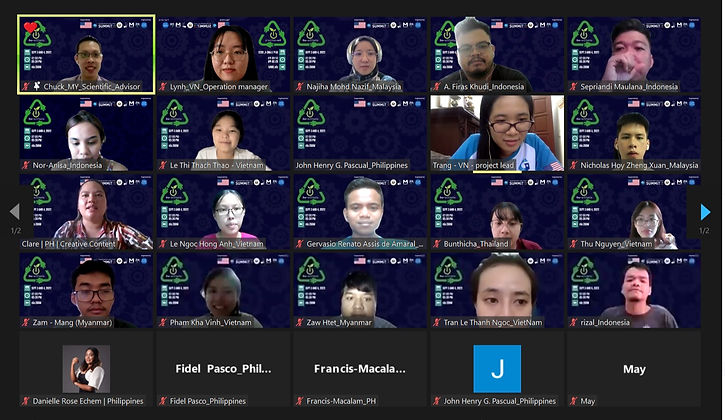Do you remember how many electronic devices you have used and changed in your life? And what has happened to those discarded devices? Do you know the whereabouts of those different sorts of e-waste?
It is estimated that 57.4 Mt (Million Metric Tonnes) of e-waste was generated globally in 2021. And only 17.4% of it is known to be collected and properly recycled. New electronic devices are required to be created every day. The extraction and refinement of materials required to produce electronic devices create greenhouse gasses. This could be reduced or avoided if e-waste were properly treated recycled. However, e-waste management has not received much attention in ASEAN.


FRE-E-WATSE
FRE-E-WASTE program is implemented by a group of ASEAN environmental enthusiasts, STEP Forward Education and supported by the U.S. Department of State and Young Southeast Asian Leaders Initiative (YSEALI).
There are two components of the projects:
The two-day workshop, followed by a co-production of a manual on e-waste seeks to bring together a group of Southeast Asian environmental enthusiasts aged between 18 to 35 to connect and collaborate on e-waste issues in the region through hands-on activities including interactive skill-building sessions, expert presentations, and a game jam will be taking place online in two days: Saturday and Sunday, September 3rd-4th 2022.
Toolkit completion, in which you will finalize the toolkit with your groupmates after the workshop and in your own time. The assigned part should be handed to the team by 25 September, without which you will not be able to receive the certificate of completion.
The deadline to submit the application is August 29, 2022 (23:59 pm) GMT+8.

FRE-E-WASTE WORKSHOP
FRE-E-WASTE WORKSHOP: DAY 1
FRE-E-WASTE Project's scientific advisor, PhD in Applied Environmental Sciences Chuck Chuan Ng, is currently working as an assistant professor at Xiamen University Malaysia, gave an insightful session on INTRODUCTION TO E-WASTE MANAGEMENT IN SOUTHEAST ASIA COUNTRIES: E-waste Categories, Baseline Data on E-waste Generation, Current E-waste Management in ASEAN Countries, Recommendations for E-waste Management in ASEAN Countries. Participants also had a chance to discuss e-waste with other regional participants.
FRE-E-WASTE WORKSHOP: DAY 2
On the last day of the FREE-E-WASTE workshop, participants had an amazingly interesting and informative Q&A session with FRE-E-WASTE Project's scientific advisor, PhD in Applied Environmental Sciences Chuck Chuan Ng, is currently working as an assistant professor at Xiamen University Malaysia.
Furthermore, toolkit building was smoothly processed thanks to creative ideas which were intensely explored and contributed by all participants.
Participant Benefits
Discuss with invited experts to improve understanding of e-waste;
Promote youth involvement in the ASEAN region and Timor-Leste to address the e-waste management issues by developing leadership and creative problem-solving skills;
Receive a certificate of completion and acknowledgement of contribution to the creation of the post-workshop toolkit;
Increase social and professional skills such as leadership, networking, and teamwork through workshop activities;
Support with internet subsidies for participants (upon request).
Participant Eligibility
Applicants must:
Be a resident of one of 11 Southeast Asian countries: Brunei, Cambodia, Indonesia, Laos, Malaysia, Myanmar, Philippines, Singapore, Thailand, Timor-Leste, or Vietnam;
Be between the ages of 18 and 35 at the time of application;
Be proficient in reading, writing, and speaking English;
Be willing to participate in the program actively;
Have a commitment to participate in the whole program: attend a two-day workshop and complete the toolkit based on what they have learned as the toolkit is revised in consultation with invited experts to make the final version downloadable for public access to all Southeast Asian countries.
Criteria for selection
Completion of application form including uploading your CV and answering the following questions:
What do you know about e-waste in your country?
Why do you want to apply for the program?
What do you expect to learn from the program?
What can you contribute in terms of e-waste to the program?
Any other relevant information that you wish to share?
Experience in the environmental field (academic, voluntary or professional)
Having a strong interest in environmental issues;
Commitment to attend the two-day workshop and create the post-workshop toolkit.


_edited.jpg)
_edited.jpg)